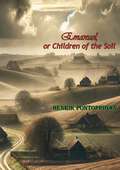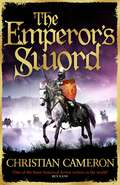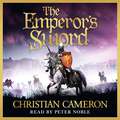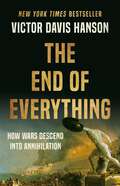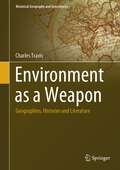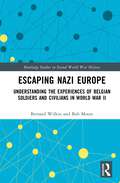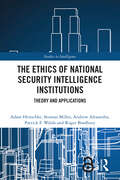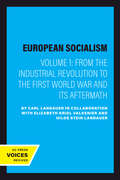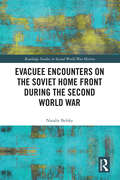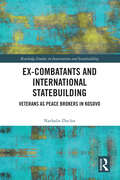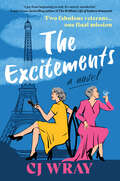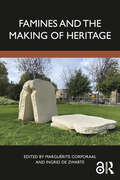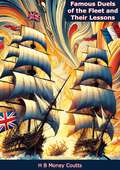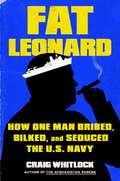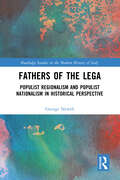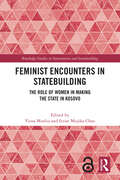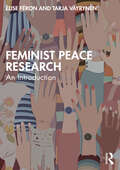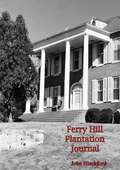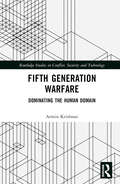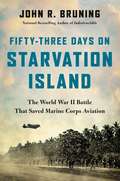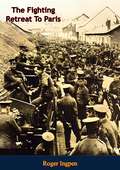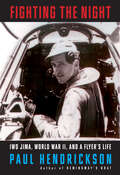- Table View
- List View
Eliza Pinckney: Women Of Colonial And Revolutionary Times
by Harriott Horry RavenelDiscover the remarkable life and legacy of one of Colonial America's most influential women in Harriott Horry Ravenel's captivating biography, "Eliza Pinckney." This meticulously researched book delves into the extraordinary story of Eliza Lucas Pinckney, whose innovations in agriculture and contributions to society left an indelible mark on the American South.Born in Antigua and raised in South Carolina, Eliza Pinckney's life was marked by resilience, intelligence, and a pioneering spirit. At a young age, she assumed the management of her family's plantations and began experimenting with indigo cultivation, a crop that would become a cornerstone of South Carolina's economy. Ravenel’s biography vividly portrays Eliza's innovative agricultural techniques and her success in establishing indigo as a profitable export, which had a lasting impact on the region’s prosperity.Through engaging narrative and rich historical detail, Ravenel captures Eliza’s multifaceted life, including her role as a devoted mother, wife, and community leader. The book highlights her correspondence with key figures of the time, providing insights into her thoughts and the challenges she faced as a woman in a predominantly male-dominated society."Eliza Pinckney" also explores her broader contributions to American history, from her influence on education and social welfare to her role in shaping the political landscape through her sons, Charles Cotesworth Pinckney and Thomas Pinckney, who became prominent statesmen.Ravenel's biography is not just a tribute to Eliza Pinckney's accomplishments but also a window into the complexities of colonial life and the pivotal role women played in shaping early American society.
Emanuel, or Children of the Soil
by Henrik PontoppidanImmerse yourself in the profound and evocative world of rural Denmark with Henrik Pontoppidan's Emanuel, or Children of the Soil. This literary masterpiece, written by one of Denmark’s most celebrated authors and a Nobel Prize laureate, offers a compelling exploration of the human condition, societal struggles, and the timeless connection between people and the land they inhabit.Set against the backdrop of the Danish countryside, Emanuel, or Children of the Soil follows the life of Emanuel Hansted, a young idealist with a deep love for nature and a passion for social justice. Emanuel's journey is one of personal growth and disillusionment as he confronts the harsh realities of rural life and the complexities of human nature.Pontoppidan’s rich and nuanced narrative delves into the lives of the rural community, portraying their joys, sorrows, and enduring spirit with great empathy and detail. Through Emanuel's interactions with the villagers, Pontoppidan examines themes of tradition, progress, and the inevitable conflicts that arise when old ways meet new ideas.The novel is a vivid portrayal of the socio-economic changes occurring in late 19th-century Denmark, capturing the tensions between the agrarian past and the industrial future. Pontoppidan's exquisite prose brings the Danish landscape to life, painting a vivid picture of the fields, forests, and farms that shape the characters' lives and destinies.Emanuel, or Children of the Soil is more than just a story of one man's journey; it is a reflection on the broader human experience, exploring universal themes of hope, struggle, and the quest for meaning. Pontoppidan’s deep philosophical insights and his ability to convey the inner lives of his characters make this novel a timeless and thought-provoking read.
The Emperor's Sword: Pre-order the brand new adventure in the Chivalry series! (Chivalry #6)
by Christian CameronThe penultimate instalment in the Chivalry series from a master of historical fiction.The Chivalry series follows young William Gold, who runs away from London to follow the Black Prince, from the killing fields of France, through life as a routier and criminal, and to redemption with the Knights of Saint John, further disillusion and an eventual career as a professional soldier and knight. Rich in the details of life in the High Middle Ages, the series also deals with modern issues about the role of violence in society, rules of conflict and war, and the price that people pay for using violence.'One of the finest historical fiction writers in the world' BEN KANE'The master of historical fiction' SUNDAY TIMES'A storyteller at the height of his powers' HISTORICAL NOVEL SOCIETY
The Emperor's Sword: Pre-order the brand new adventure in the Chivalry series! (Chivalry #6)
by Christian CameronThe penultimate instalment in the Chivalry series from a master of historical fiction.The Chivalry series follows young William Gold, who runs away from London to follow the Black Prince, from the killing fields of France, through life as a routier and criminal, and to redemption with the Knights of Saint John, further disillusion and an eventual career as a professional soldier and knight. Rich in the details of life in the High Middle Ages, the series also deals with modern issues about the role of violence in society, rules of conflict and war, and the price that people pay for using violence.'One of the finest historical fiction writers in the world' BEN KANE'The master of historical fiction' SUNDAY TIMES'A storyteller at the height of his powers' HISTORICAL NOVEL SOCIETY
The Emperor's Sword: Pre-order the brand new adventure in the Chivalry series! (Chivalry #6)
by Christian CameronThe penultimate instalment in the Chivalry series from a master of historical fiction.The Chivalry series follows young William Gold, who runs away from London to follow the Black Prince, from the killing fields of France, through life as a routier and criminal, and to redemption with the Knights of Saint John, further disillusion and an eventual career as a professional soldier and knight. Rich in the details of life in the High Middle Ages, the series also deals with modern issues about the role of violence in society, rules of conflict and war, and the price that people pay for using violence.'One of the finest historical fiction writers in the world' BEN KANE'The master of historical fiction' SUNDAY TIMES'A storyteller at the height of his powers' HISTORICAL NOVEL SOCIETY
The End of Everything: How Wars Descend Into Annihilation
by Victor Davis HansonVictor Davis Hanson, an historian charts how and why some societies chose to utterly destroy their foes, and warns that similar wars of obliteration are possible in our time. <P><P> War can settle disputes, topple tyrants, and bend the trajectory of civilization—sometimes to the breaking point. From Troy to Hiroshima, moments when war has ended in utter annihilation have reverberated through the centuries, signaling the end of political systems, cultures, and epochs. Though much has changed over the millennia, human nature remains the same. Modern societies are not immune from the horror of a war of extinction. <P><P> In The End of Everything, military historian Victor Davis Hanson narrates a series of sieges and sackings that span the age of antiquity to the conquest of the New World to show how societies descend into barbarism and obliteration. In the stories of Thebes, Carthage, Constantinople, and Tenochtitlan, he depicts war’s drama, violence, and folly. Highlighting the naivete that plagued the vanquished and the wrath that justified mass slaughter, Hanson delivers a sobering call to contemporary readers to heed the lessons of obliteration lest we blunder into catastrophe once again. <p> <b>New York Times Bestseller</b>
Environment as a Weapon: Geographies, Histories and Literature (Historical Geography and Geosciences)
by Charles TravisEnvironment as a Weapon considers how the confluence of war and nature from the time of the Agricultural Revolution (10,000 BCE) to our present day has been represented in works of history, geography, and literature. In the Epic of Gilgamesh, the Torah and Greco-Roman myths, warfare is a trope commensurate with environmental disasters, extreme climate, and plague. In the medieval age myths the Táin, and Beowulf environments become allies and enemies. The equestrian steppeland as foundation of Genghis Khan’s and his heirs Pax Mongolica is chronicled in The Secret History of the Mongols and The Travels of Marco Polo. The West African Griot legend of Sundiata and the Little Ice Age wreck of the Spanish Armada in 1588 speak to oceanic and atmospheric dimensions of warfare. American Revolution political pamphlets, poetry, diaries and weather logs, reflect the severe weather and terrain deployed by George Washington’s early campaigns in the war of independence. Napoleon’s midwifing of Total War is captured in Mary Shelley’s Frankenstein, Leo Tolstoy’s War and Peace, and Charles Minard’s Carte figurative carto-graph of the disastrous 1812 French invasion of Russia. The U.S. Civil War and the organic-industrial assembles of its battles, arguably the first Anthropocene War, is parsed by the clarifying poetry of Emily Dickinson. Geopolitik and geo-hazards of flood and fire feature in the Global War works of Samuel Beckett, Kurt Vonnegut and James Dickey. The literature of Vietnamese and American war combat veterans reveals how North Vietnam’s Environmental Military Complex stalled the American Military Industrial Complex in the jungles, and R&R districts of southwestern Asia. Finally, he sci-fi of H.G. Wells’ World Set Free and David Mitchell’s Cloud-Atlas frame Oppenheimer’s sub-atomic deployments at Hiroshima and Nagasaki, James Lovelock’s ‘Gaia’ and U.S. military discourses situating global warming as a national security threat to America. Indeed, Environment and War ironically resonates with U.N. Secretary General António Guterres proclamation that “seventy-five years ago, the world emerged from a series of cataclysmic events: two successive world wars, genocide, a devastating influenza pandemic . . . Our founders gathered in San Francisco promising to save succeeding generations from the scourge of war.” Thus, a holistic approach to studying and mitigating the human and environmental impacts of warfare, must integrate methods from the arts, humanities and sciences. This involves understanding how the historical geographies of the Earth’s planetary systems have been perceived, deployed and emerged as agents of warfare, with the lithosphere, hydrosphere, cryosphere, biosphere and atmosphere transformed as arsenals against anthropogenic global warming. This book will be of interest to geographers, historians, and scholars in environmental studies, climate change, literature and military studies, as well as the broader environmental humanities.
Escaping Nazi Europe: Understanding the Experiences of Belgian Soldiers and Civilians in World War II (Routledge Studies in Second World War History)
by Bernard Wilkin Bob MooreThis book chronicles the escapes attempted by Belgian soldiers and civilians from Nazi-occupied Europe during the Second World War. Insofar as is practical, the authors have tried to let the subjects speak for themselves by making extensive use of their testimonies preserved in archives in Belgium and the United Kingdom. The book begins with the stories of soldiers who managed to evade capture in the summer of 1940 and returned home, and the few that decided to continue the fight and joined the Allied forces in the United Kingdom. It also includes the prisoners of war who managed to escape from camps or Arbeitskommando inside the Reich and provides a detailed analysis of their narratives: their motivation for going on the run, their choices on when and how to travel, and the many obstacles they encountered along the way. Most escapees were content to return home, with some then joining resistance organisations, but a small minority were committed to joining the Allies, and further chapters recount their attempts to reach Spain and Switzerland, and the additional problems they encountered in those neutral states. Final chapters reflect on the penalties inflicted on prisoners of war who were recaptured and on the escapees’ struggle for recognition in the post-war world.
The Ethics of National Security Intelligence Institutions: Theory and Applications (Studies in Intelligence)
by Adam Henschke Seumas Miller Andrew Alexandra Patrick F. Walsh Roger BradburyThis book explores the ethics of national security intelligence institutions operating in contemporary liberal democracies.Intelligence collection by agencies such as the CIA, MI6, and Mossad involves practices that are apparently inconsistent with the principles of ordinary morality – practices such as lying, spying, manipulation, and covert action. However, in the defence of national security, such practices may not only be morally permissible, but may also under some circumstances be morally obligatory. One approach to the ethics of national security intelligence activity has been to draw from the just war tradition (so-called ‘just intelligence theory’). This book identifies significant limitations of this approach and offers a new, institutionally based, teleological normative framework. In doing so, it revises some familiar principles designed for application to kinetic wars, such as necessity and proportionality, and invokes some additional ones, such as reciprocity and trust. It goes on to explore the applications of this framework and a revised set of principles for national security intelligence institutions and practices in contemporary and emerging political and technological settings.This book will be of much interest to students of intelligence studies, ethics, security studies and International Relations.
European Socialism, Volume I: From the Industrial Revolution to the First World War and Its Aftermath
by Carl LandauerThis title is part of UC Press's Voices Revived program, which commemorates University of California Press’s mission to seek out and cultivate the brightest minds and give them voice, reach, and impact. Drawing on a backlist dating to 1893, Voices Revived makes high-quality, peer-reviewed scholarship accessible once again using print-on-demand technology. This title was originally published in 1959.
Evacuee Encounters on the Soviet Home Front During the Second World War (Routledge Studies in Second World War History)
by Natalie BelskyThis study is the first to examine the experiences of the millions of Soviet civilians evacuated to the interior of the country during the Second World War in the context of their encounters and relations with local communities and populations across Soviet Central Asia, Kazakhstan, Siberia, and the Urals. The book considers the impact of this episode of massive population displacement across Eurasia on individuals, communities, and society more broadly. It explores how the challenges associated with wartime displacement gave rise to tensions between evacuees and local residents. These frictions, in turn, forced individuals to interrogate the meaning, terms, and limitations of citizenship and belonging in the Soviet Union. Evacuation thus played a critical role in the changing relationship between citizens and the Soviet state in the war and postwar periods. Furthermore, this study pays particular attention to the plight of Soviet Jewish evacuees, who constitute the largest contingent of Holocaust survivors in Europe, and the rise of anti-Semitism on the Soviet home front during the war. This volume will be of interest to students and scholars of the Second World War, migration and displacement, the Holocaust, Soviet Jewish history, and the Soviet experience more broadly.
Ex-Combatants and International Statebuilding: Veterans as Peace Brokers in Kosovo (Routledge Studies in Intervention and Statebuilding)
by Nathalie DuclosThis book examines the international efforts to regulate violence in Kosovo since 1999 through the United Nations Mission in Kosovo (UNMIK) and covers 15 years of international presence.The book analyses the process of implementing international policies from a sociological perspective, and looks at the adaptations and arrangements of public policies achieved through the transactions of international actors with local actors, who are at the heart of policy implementation. In particular, it analyses the disarmament, demobilisation, and reintegration of combatants (DDR) programme and shows the extent to which it was co-produced with Kosovo Liberation Army (KLA) leaders co-opted by international administrators. These analyses take the opposite view to the work that considers ex-combatants as spoilers. In Kosovo, the combatant leaders acted as peace brokers, facilitating demobilisation and exercising disciplinary control over rank-and-file combatants. Their position as brokers helped them to take control of the new state being built under international administration. This book shows the importance of the relationship between ex-combatants and the state and illustrates the multiplicity of their possible trajectories, including political ones. To elucidate the dynamics of co-production in shaping DDR policies and hybridising international policies as well as in state formation, the book relies on around a hundred interviews with ex-combatants of the KLA and with international personnel, as well as on the archives of international organisations and observations in the field.This book will be of much interest to students of international statebuilding, peace and conflict studies, Balkan politics and international relations.
The Excitements: A Novel
by CJ Wray"Irresistible...Filled with surprise, poignancy, and excitement, this is a surefire winner." --Publishers Weekly (starred review)A brilliant and witty drama about two brave female World War II veterans who survived the unthinkable without ever losing their killer instinct…or their joie de vivre.Meet the Williamson sisters, Britain’s most treasured World War II veterans. Now in their late nineties, Josephine and Penny are in huge demand, popping up at commemorative events and history festivals all over the country. Despite their age, they’re still in great form—perfectly put together, sprightly and sparky, and always in search of their next “excitement.”This time it’s a trip to Paris to receive the Légion d’honneur for their part in the liberation of France. And as always, they will be accompanied by their devoted great-nephew, Archie.Keen historian Archie has always been given to understand that his great aunts had relatively minor roles in the Women’s Royal Navy and the First Aid Nursing Yeomanry, but that’s only half the story. Both sisters are hiding far more than the usual “official secrets”. There’s a reason sweet Auntie Penny can dispatch a would-be mugger with an umbrella.This trip to Paris is not what it seems either. Scandal and crime have always quietly trailed the Williamson sisters, even in the decades after the war. Now armed with new information about an old adversary, these much decorated (but admittedly ancient) veterans variously intend to settle scores, avenge lost friends, and pull off one last, daring heist before the curtain finally comes down on their illustrious careers.
Fallen Comrade: A Story of the Korean War
by Walter HowellFallen Comrade: A Story of the Korean War presents an account of three young men from Clinton, Mississippi, who served in the US Marine Corps during the Korean War. Waller King, Joe Albritton, and Homer Ainsworth were childhood friends who grew up in the same neighborhood, went to the same schools, attended the same church, and eventually joined the same Marine Corps reserve unit in Jackson. Through extensive interviews with people who knew them, as well as excerpts from their letters and journals, this volume traces the life experiences of King, Albritton, and Ainsworth through their adolescence and into the war. Despite their shared origins, the three young men met different fates. Ainsworth was in Korea just two months before he was killed. Albritton and King returned home after the war, but Albritton died tragically in an automobile accident mere weeks later. King went on to college and experienced success in business, the joys of a family, and the rewards of community service, all of which were denied his childhood friends by their early deaths. Part biography and part military history, Fallen Comrade examines what happened to three young men from Clinton, their childhood in small-town Mississippi, their service as Marines in Korea, and their legacy to their hometown.
Famines and the Making of Heritage
by Marguérite Corporaal Ingrid De ZwarteFamines and the Making of Heritage is the first book to bring together groundbreaking research on the role of European famines in the nineteenth and twentieth centuries in relation to heritage making, museology, commemoration, education, and monument creation.Featuring contributions from famine experts across Europe and North America, the volume adopts a pioneering transnational perspective, and discusses issues such as contestable and repressed heritage, materiality, dark tourism, education on famines, oral history, multidirectional memory, and visceral empathy. Questioning why educational curricula and practices in schools and on heritage sites are region- or nation-oriented or transnational, chapters also consider whether they emphasise conflict or mutual understanding. Contributions also consider how present issues of European concern – such as globalisation, commodification, human rights, poverty, and migration – intersect with the heritage and memory of modern European famines. Lastly, the book considers what role emigrant and diasporic communities within and outside Europe play in the development of famine heritage and educational practices – and whether famine heritage is accessible to them.Famines and the Making of Heritage provides a crucial resource for museum and heritage scholars, students and professionals working on or with difficult or dark heritages, as well as those interested in the study of famines and legacies of troubled pasts.
Famous Duels of the Fleet and Their Lessons
by H B Money CouttsDelve into the thrilling and dramatic world of naval warfare with H. B. Money Coutts's Famous Duels of the Fleet and Their Lessons. This compelling work brings to life some of the most notable naval duels in dur the French Revolutionary and Napoleonic Wars, offering readers a detailed and vivid account of these intense maritime conflicts and the strategic insights they provide.H. B. Money Coutts, a respected historian and naval expert, meticulously examines a series of famous naval engagements, exploring the tactics, leadership, and bravery that defined these encounters. Through clear and engaging narrative, Coutts reconstructs each duel, providing readers with an immersive experience of the action and decision-making that took place on the high seas.Famous Duels of the Fleet and Their Lessons is an essential read for naval enthusiasts, historians, and anyone interested in the intricacies of maritime warfare. Coutts's thorough research and engaging storytelling make this book both informative and captivating, shedding light on the heroism and strategic genius that have shaped naval history.Join H. B. Money Coutts on a journey through the high-stakes world of naval duels, and discover the lessons of courage, strategy, and leadership that emerge from these historic encounters. Famous Duels of the Fleet and Their Lessons is a timeless exploration of naval warfare that continues to inspire and educate readers about the enduring legacy of naval conflict.
Fat Leonard: How One Man Bribed, Bilked, and Seduced the U.S. Navy
by Craig Whitlock#1 New York Times bestselling author Craig Whitlock&’s masterful account of one of the biggest public corruption scandals in American history—exposing how a charismatic Malaysian defense contractor bribed scores of high-ranking military officers, defrauded the US Navy of tens of millions of dollars, and jeopardized our nation&’s security.All the admirals in the US Navy knew Leonard Glenn Francis—either personally or by his legendary reputation. He was the larger-than-life defense contractor who greeted them on the pier whenever they visited ports in Asia, ready to show them a good time after weeks at sea while his company resupplied their ships and submarines. He was famed throughout the fleet for the gluttonous parties he hosted for officers: $1,000-per-person dinners at Asia&’s swankiest restaurants, featuring unlimited Dom Pérignon, Cuban cigars, and sexy young women. On the surface, with his flawless American accent, he seemed like a true friend of the Navy. What the brass didn&’t realize, until far too late, was that Francis had seduced them by exploiting their entitlement and hubris. While he was bribing them with gifts, lavish meals, and booze-fueled orgies, he was making himself obscenely wealthy by bilking American taxpayers. Worse, he was stealing military secrets from under the admirals&’ noses and compromising national security. Based on reams of confidential documents—including the blackmail files that Francis kept on Navy officers—Fat Leonard is the full, unvarnished story of a world-class con man and a captivating testament to the corrosive influence of greed within the ranks of the American military.
Fathers of the Lega: Populist Regionalism and Populist Nationalism in Historical Perspective (Routledge Studies in the Modern History of Italy)
by George NewthThis book investigates the historical roots of the Italian Republic’s oldest surviving political party, the populist far right Lega (Nord), tracing its origins to post-war Italy. The author examines two main case studies: the Movements for Regional Autonomy (MRAs), the Piedmontese Movement for Regional Autonomy (the MARP) and the Bergamascan Movement for Autonomy (the MAB), both of which formed a first wave of post-war populist regionalism from 1955 until 1960. The regionalist leagues which later emerged in both Piedmont and Lombardy in the 1980s – and which would later form part of the Lega Nord – represented in many ways a revival of the MRAs’ populist regionalist discourse and ideology and, therefore, a second wave of post-war populist regionalism. Despite this, neither the MRAs nor the twenty year gap between these waves of activism have received the attention they deserve. Drawing on a series of archival and secondary sources this book takes an innovative approach which blends concepts and theories from historical sociology and political science. It also provides a nuanced examination of the continuities and discontinuities between the MRAs and the Lega from the 1950s until time of publication. This contributes to debates not only in contemporary Italian history, but also populism and the far right. While rooted in historical approaches, the book’s interdisciplinarity makes it suitable for students and researchers across a variety of subject areas including European history, modern history, and political history.
Feminist Encounters in Statebuilding: The Role of Women in Making the State in Kosovo (Routledge Studies in Intervention and Statebuilding)
by Vjosa Musliu Itziar Mujika ChaoThis volume provides one of the first comprehensive feminist readings of international statebuilding, with a specific focus on the case of Kosovo.Rather than simply showing how the state in Kosovo is being built by and through women and feminist encounters, this volume is interested to problematise women and feminist subjectivities vis-à-vis the state and statebuilding. The book challenges three main arguments related to the processes and subjects of statebuilding in Kosovo. First, the academic literature on Kosovo has a tendency to take the international intervention of 1999 as the originary point of statebuilding processes in Kosovo. Second, and relatedly, given Kosovo's unprecedented exposure to Western intervention and statebuilding, the majority of works start from the presumption that liberal interventionism in Kosovo (and elsewhere) is normatively more progressive than the previous system, and that the liberal interventionism and statebuilding are naturally gender progressive and gender-equal. The third argument has to do with the existing legal architecture on gender and women’s rights in contemporary Kosovo. The aim of the volume is to, on the one hand, problematise the evidence against the backdrop of everyday manifestations and/or performances of statebuilding and on the other hand interrogate the co-constitutive gender aspect. In terms of methodology, the volume brings together contributions that rely on traditional and multi-sited ethnography, and narrative research rooted in projects and initiatives in Kosovo. This allows the contributors to unearth new and silenced actors, entry points, subjects and subjectivities in processes of and related to statebuilding in Kosovo; feminist frictions and challenges to statebuilding in Kosovo; as well as encounters of heteronormative statebuilding.This book will be of much interest to students of statebuilding, Balkan politics, feminisms, and international relations, in general.The Open Access version of this book, available at www.taylorfrancis.com, has been made available under a Creative Commons Attribution-Non Commercial-No Derivatives (CC-BY-NC-ND) 4.0 International license.
Feminist Peace Research: An Introduction
by Élise Féron Tarja VäyrynenThis textbook provides a comprehensive overview of the field of gender, feminism and peace.It is based on the argument that feminist thinking is necessary to understand and analyse the core issues in peace and conflict studies and is fundamental to thinking about solutions to global problems and to promoting peaceful conflict transformation. The book centres alternative and critical approaches missing in mainstream peace research and brings forward feminist perspectives on traditional peace research topics such as militarism, peacekeeping, arms trade and the articulation of different forms of violence. It also advances critical and alternative issues and topics that traditional peace research has sidelined, including, for example, artificial intelligence, technologies and peace; trauma and memory; human–non-human species relations; art; popular culture; post-colonial and decolonial feminist perspectives; and the queering of war and peace. In sum, this textbook contributes to the visibility of these feminist critical approaches to peace research and makes them accessible to scholars and students interested in the subject.This book will be of much interest to students of peace studies, feminist theory, gender studies and International Relations.
Ferry Hill Plantation Journal, January 4, 1838 to January 15, 1839
by John Blackford Fletcher Melvin GreenFascinating journal of a small farm holder in Maryland in the Antebellum South.“Life at Ferry Hill was very different from that on a major staple crop plantation where the laborers worked in gangs, in routine, and under close supervision. The cultivation and harvesting of corn, wheat, barley, oats, rye, clover, hay, and potatoes; the threshing and milling of the grain; the daily feeding and care of cattle, horses, sheep and hogs, and the slaughter of animals and curing of meats; the growing, harvesting, and preservation of apples, and the manufacture of cider, vinegar, and apple butter therefrom; the daily supervision of the ferry; and the cutting of wood for fuel and timber for lumber and shingles for sale, all of which took place at Ferry Hill, could not easily be carried on by slave gangs in routine and under supervision. Consequently the laborers at Ferry Hill worked individually with little or no supervision. Nor were they assigned tasks to do. Blackford never employed an overseer, he chose to manage the plantation himself and to give general supervision to his slaves and hired laborers. But he did not, as a small farmer would have done, work with his slaves. He did no manual labor. It was his function to formulate policies and see that they were carried out. Nor was Blackford and his plantation unique in this respect. They were typical of many planters and plantations of the Maryland-Virginia area.The Ferry Hill Journal furnishes its own warranty of truth and authenticity. It deals concretely, unconsciously, generally impersonally, and in evident faithfulness with life as it was lived on the plantation. Since Blackford was the supervisor as well as owner he not only saw but experienced the life about which he wrote.”-Introduction.
Fifth Generation Warfare: Dominating the Human Domain (Routledge Studies in Conflict, Security and Technology)
by Armin KrishnanThis book outlines the concept of Fifth Generation Warfare (5GW) and demonstrates its relevance for understanding contemporary conflicts.Non-kinetic modes of attack and war waged by groups or non-state actors at the societal level has been termed 5GW. This book discusses the theory of generational warfare and explores the key ideas of 5GW, such as secrecy, the manipulation of proxies, the manipulation of identity and culture (including disinformation and big data), and the use of psychological warfare. These techniques are used to achieve strategic objectives, such as inducing desired behaviour and controlling human terrain, without resorting to overt war or overt violence. The text expands the debate on 5GW by exploring emerging technologies and how they could be used for maliciously shaping human society and even for maliciously changing the genetic makeup of a population for the purpose of unprecedented social control. The work closes with comments on the possibility of a Sixth Generation of Warfare, which targets technical systems to possibly collapse a society through strategic sabotage. Overall, the book demonstrates the relevance of 5GW for understanding contemporary conflicts, from the Arab Spring to the war in Ukraine, in terms of the need for dominating the human domain.This book will be of interest to students of security and technology, defence studies and International Relations.
Fifty-Three Days on Starvation Island: The World War II Battle That Saved Marine Corps Aviation
by John R BruningThe pivotal true story of the first fifty-three days of the standoff between Imperial Japanese and a handful of Marine aviators defending the Americans dug in at Guadalcanal, from the New York Times bestselling author of Indestructible and Race of Aces. On August 20, 1942, twelve Marine dive-bombers and nineteen Marine fighters landed at Guadalcanal. Their mission: defeat the Japanese navy and prevent it from sending more men and supplies to "Starvation Island," as Guadalcanal was nicknamed. The Japanese were turning the remote, jungle-covered mountain in the south Solomon Islands into an air base from which they could attack the supply lines between the U.S. and Australia. The night after the Marines landed and captured the partially completed airfield, the Imperial Navy launched a surprise night attack on the Allied fleet offshore, resulting in the worst defeat the U.S. Navy suffered in the 20th century, which prompted the abandonment of the Marines on Guadalcanal. The Marines dug in, and waited for help, as those thirty-one pilots and twelve gunners flew against the Japanese, shooting down eighty-three planes in less than two months, while the dive bombers, carried out over thirty attacks on the Japanese fleet. Fifty-Three Days on Starvation Island follows Major John L. Smith, a magnetic leader who became America&’s top fighter ace for the time; Captain Marion Carl, the Marine Corps&’ first ace, and one of the few survivors of his squadron at the Battle of Midway. He would be shot down and forced to make his way back to base through twenty-five miles of Japanese-held jungle. And Major Richard Mangrum, the lawyer-turned-dive-bomber commander whose inexperienced men wrought havoc on the Japanese Navy. New York Times bestselling author John R. Bruning depicts the desperate effort to stop the Japanese long enough for America to muster reinforcements and turn the tide at Guadalcanal. Not just the story of an incredible stand on a distant jungle island, Fifty-Three Days on Starvation Island also explores the consequences of victory to the men who secured it at a time when America had been at war for less than a year and its public had yet to fully understand what that meant. The home front they returned to after their jungle ordeal was a surreal montage of football games, nightclubs, fine dining with America&’s elites, and inside looks at dysfunctional defense industries more interested in fleecing the government than properly equipping the military. Bruning tells the story of how one battle reshaped the Marine Corps and propelled its veterans into the highest positions of power just in time to lead the service into a new war in Southeast Asia.
The Fighting Retreat To Paris
by Roger IngpenIncludes The First World War On The Western Front 1914-1915 Illustrations Pack with 101 maps, plans, and photos.A fascinating view of the opening phases of the First World War.“Imperial Germany had long planned the conflict that was to become the First World War, but when the onslaught came there was little sign that the nations which would be embroiled were prepared for the storm. Germany advanced in the east and west where French and Belgian armies were forced to retire by overwhelming odds. The small British Army, the 'B. E. F', was rushed to the continent with most of its troops having less than a week between garrison life and the firing line. Under Sir John French, it was allocated the western end of the line, and at Mons it inflicted far more causalities on the enemy than its numbers would suggest. No army of its size, however, could stand against the German superiority in men (at least five to one) or artillery and machine guns. An envelopment was inevitable and so a stubbornly fought retreat was ordered. Near Le Cateau, the British turned at bay and Smith-Dorrien's determination to stand and fight undoubtedly saved the British Army from annihilation. Many people imagine the First World War as a stalemate of mud, wire and trenches, but in the first six months it was a great European war fought in much the same way that Napoleon, Wellington and Blucher had fought a century before.”-Print ed.
Fighting the Night: Iwo Jima, World War II, and a Flyer's Life
by Paul HendricksonFrom the acclaimed and best-selling author of Hemingway&’s Boat, the profoundly moving story of his father&’s wartime service as a night fighter pilot, and the prices he and his fellow soldiers paid for their acts of selfless, patriotic sacrificeIn the fall of 1944, Joe Paul Hendrickson, the author&’s father, kissed his twenty-one-year-old wife and two baby children goodbye. The twenty-five-year-old first lieutenant, pilot of a famed P-61 Black Widow, was leaving for the war. He and his night fighter squadron were sent to Iwo Jima, where, for the last five and a half months of World War II, he flew approximately seventy-five missions, largely in pitch-black conditions. His wife would wait out the war at the home of her small-town Ohio parents, one of the countless numbers of American family members shouldering the burden of being left behind.Joe Paul, the son of a Depression-poor Kentucky sharecropper, was fresh out of high school in 1937 when he enlisted in mechanic school in the peacetime Army Air Corps. Eventually, he was able to qualify for flight school. After marriage, and with the war on, the young officer and his bride crisscrossed the country, airfield to airfield, base to base: Santa Ana, Yuma, Kissimmee, Bakersfield, Orlando, La Junta, Fresno. He volunteered for night fighters and the newly arrived and almost mythic Black Widow. A world away, the carnage continued. As Paul Hendrickson tracks his parents&’ journey, together and separate, both stateside and overseas, he creates a vivid portrait of a hard-to-know father whose time in the war, he comes to understand, was something truly heroic, but never without its hidden and unhidden psychic costs.Bringing to life an iconic moment of American history, and the tragedy of all wars, Fighting the Night is an intense and powerful story of violence and love, forgiveness and loss. And it is a tribute to those who got plunged into service, in the best years of their lives, and the sacrifices they and their loved ones made, then and thereafter.

